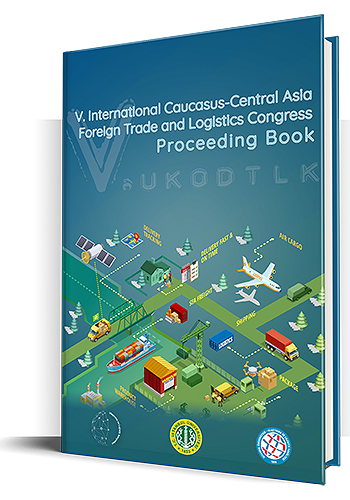
Ulaştırma ve Lojistik Kongreleri
- Türkçe
- Özet
- 2019
Ulusal ve Uluslararası Karayolu İle Eşya Taşımasında Taşıma Ücreti
Ramazan Durgut
Dr. Öğr. Üyesi, İstanbul Üniversitesi, İstanbul, Türkiye
Bir ticari işletme faaliyeti olarak taşıma işleri, Türk Ticaret Kanunu’nun (TTK) 4. Kitabında düzenlenmiş olup (TTK m. 850 vd.), bu kapsamda taşıma işini gerçekleştiren taşıyıcı tacir sıfatına sahiptir (TTK m. 12/1). Taşıma sözleşmesiyle taşıyıcı, eşyayı varma yerine götürmeyi ve orada gönderilene teslim etmeyi; buna karşılık gönderen de taşıyıcıya, taşıma ücretini ödemeyi borçlanmaktadır (TTK m. 850/2). Ücret, taşıma sözleşmesinin bir unsuru olup ücretsiz yapılan taşımalar (hatır taşımaları) TTK kapsamı dışında kalmaktadırlar. Taşıma ücreti, taşıma sözleşmesinde açıkça kararlaştırılabilir ve taşıma senedine de kaydedilebilir (TTK m. 857/1k). Sözleşmeyle kararlaştırılmasa bile, taşıyıcı tacir olduğundan ve ücret taşıma sözleşmesinin aslı bir unsuru olduğundan, taşıyıcı yine ücret talep edebilir (TTK m. 20/1). Bu durumda ücret, tarifeye göre [Karayolu Taşıma Kanunu (KTK) m. 11]; tarife söz konusu değilse taşıma konusu eşyanın türü ve miktarı, mesafe, güzergâh durumu gibi hususlar dikkate alınarak mahkemece belirlenecektir (TTK m. 870/4). Ücret, bir miktar paranın ödenmesi şeklinde olabileceği gibi, paradan başkaca menfaatler de olabilir. Taşıma ücretini, kural olarak gönderen ödemekle yükümlüdür (TTK m. 850/2) ve taşıyıcı eşyayı teslimle birlikte taşıma ücretine hak kazanır (TTK m. 870/1). Gönderilen de eşyanın teslim yerine varmasından sonra taşıyıcıdan, eşyanın kendisine teslim edilmesini istemekle birlikte, taşıma ücretini ödeme yükümlülüğü altına girmektedir (TTK m. 871/1 ve 2). Eğer gönderilen, taşıma ücretini ödemek istemezse, taşıyıcı eşyayı gönderilene teslim etmeyip eşya üzerinde hapis hakkını kullanabilir (TTK m. 891). Taşıma sözleşmesi gönderen ile taşıyıcı arasında akdedilmekle birlikte, taşıyıcı eşyayı kendisi taşımayıp alt taşıyıcılara taşıtabilir. Böyle alt taşıma sözleşmesinin kurulduğu durumlarda, eşyayı fiilen taşıyan alt taşıyıcılar taşıma ücretini gönderenden değil de, alt taşıma sözleşmesinin tarafı olan akdi taşıyıcıdan talep edebilirler. Taşıma ücreti, dar ve geniş anlamda taşıma ücreti olarak ikiye ayrılmaktadır. Taşıyıcının eşyayı varma yerine götürerek gönderilene teslim etmesi karşılığında isteyebileceği ücret (TTK m. 850/2), dar anlamda taşıma ücretidir. Buna karşılık, taşıyıcının taşıma sözleşmesini ifası kapsamında, gönderen veya gönderilenden talep edebileceği giderler, tazminatlar, bekleme ücreti vs. alacaklar ise geniş anlamda taşıma ücretini oluşturmaktadır (TTK m. 870/1 ve 3). Çalışmada dar anlamda taşıma ücreti incelenecektir. Uluslararası karayolu ile eşya taşımalarıyla ilgili, Türkiye’nin de taraf olduğu, Karayolu ile Uluslararası Eşya Taşınması Sözleşmesine İlişkin Anlaşmada (CMR), taşıma ücreti özel olarak düzenlenmemiştir. CMR m. 1 uyarınca, anlaşmanın uygulama şartlarından biri de taşımanın ücret karşılığında yapılmasıdır. CMR m. 6/1ı’ya göre, taraflar, taşıma ücretiyle ilgili hususları taşıma senedine kaydedebilirler. Taşıma ücretini ödemekle yükümlü olan kişi ve ücretin hesaplanmasıyla ilgili TTK’daki hükümler CMR’de yer almamaktadır. CMR’nin uygulanmasının gerektiği uluslararası eşya taşımalarındaki taşıma ücretiyle ilgili hususlarda, uygulanacak hukukun Türk hukuku olması durumunda, TTK’daki ücretle ilgili özel hükümler uygulanacaktır.
Anahtar Kelimeler: Gönderici, Taşıma Ücreti, Gönderilen, Eşya taşıma, Taşıyıcı
Carriage Fee in Carriage of Goods by National and International Road
Carriage work as a commercial activity is regulated in the Book 4 of Turkish Commercial Code (TTK Art. 850 et al.) and carrier who performs carriage works has the title of trader (TTK Art. 12/1). With the carriage contract, the carrier is obliged to deliver the goods to the place designated for delivery and deliver them to the consignee there; in return, the sender is obliged to pay the carrier fee (TTK Art. 850/2). The fee is an element of the carriage contracts and free carriages (accommodation carriages) are beyond the scope of the TTK. Carriage fee can be clearly determined in the carriage contract and registered in the carriage bill (TTK Art. 857 /1-k). Even if the carriage fee is not determined in the contract, the carrier may still demand a fee because the carrier is a trader and the fee is an essential element of the carriage contract (TTK Art. 20/1). In such a case, the fee is determined according to the tariff [Road Carriage Code (KTK) m. 11]; if there is not a tariff, the fee is determined by the Court by taking several factors into consideration such as the type and quantity of the goods to be transported, distance, route status and etc. (TTK Art. 870/4). The fee may be in form of payment of some amount of money, as well as benefits other than money. As a rule, the sender is obliged to pay carriage fee (TTK Art. 850/2) and the carrier is entitled to carriage fee upon delivery (TTK Art. 870/1). After which the goods are delivered to the delivery place, the consignee enters into obligation to pay the carriage fee (TTK Art. 871/1-2) upon his request with regard to delivering the goods to him. If the consignee does not want to pay the carriage fee, the carrier may not deliver the goods to the consignee and can use his right of detention on the goods (TTK Art. 891). Although the carriage contract is concluded between the sender and the carrier, the carrier may not carry the goods itself but may get the goods carried to the subcarriers. When such sub-carriage contract is concluded, the subcarriers which actually carry the goods may request the carriage fee from the contractual carrier, which is the party of the sub-carriage contract, not the sender. The carriage fee is divided into the two groups as carriage fee in a narrow sense and carriage fee in a broad sense. The fee (TTK m. 850/2) that the carrier may demand in return for delivering the goods to the consignee by taking them to the delivery place is the carriage fee in a narrow sense. On the other hand, the receivables within the scope of the performance of the carrier in the carriage contract, the expenses, compensations, waiting fees and etc. which the sender may request, are deemed as carriage fee in a broad sense (TTK Art. 870/1 and 3). In this study, carriage fee in a narrow sense will be examined. Carriage fee is not particularly regulated in Convention on the Contract for the International Carriage of Goods by Road (CMR) which is related to carriage of goods by international road and Republic of Turkey is a party to it. According to CMR Article 1, one of the conditions of implementation of the agreement is that the carriage is executed for a fee. According to CMR Article 6/1, the parties may register the issues related to the carriage fee to the carriage bill. The provisions in TTK which are related to the person is responsible for the carriage fee and the calculation of the fee are not included in CMR. In the cases of international carriage of goods in which implementation of CMR is required, the special provisions of TTK shall be applied in cases where the applicable law is Turkish Law.
Keywords: Sender, Consignee, Carriage of Goods, Carrier, Carriage Fee


Bu çalışma, kullanan kişilere orjinal çalışmadan alıntı yaptıkları sürece, çalışmayı dağıtma, değiştirme ve üzerine çalışma hakkı tanıyan Attribution 4.0 International (CC BY 4.0) lisansı ile lisanslanmıştır.
İletişim
İstanbul Üniversitesi Ulaştırma ve Lojistik Fakültesi
İ.Ü. Avcılar Kampüsü 34320 Avcılar/İstanbul
ulk@istanbul.edu.tr
+ 90 (212) 440 00 00 - 19200


